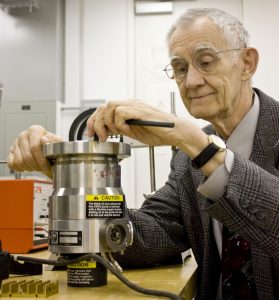Dr. John Hoffman, professor emeritus of physics and founding faculty member of UT Dallas, died Feb. 3, 2021. He was 91.
Beginning in the 1960s, Hoffman designed and built scientific instruments for satellites, planetary missions and other space probes for experiments that traveled millions of miles throughout the solar system. His mass spectrometers — instruments that measure the characteristics of atoms and molecules found in atmospheres and soils — helped explore Halley’s comet; accompanied Apollo 15, 16 and 17 astronauts to the moon and the Pioneer mission to Venus; and aided in the discovery of water on Mars.

In 1966 he joined the atmospheric and space sciences research group at the Graduate Research Center of the Southwest, which became UT Dallas in 1969. In addition to teaching, Hoffman was a member of the William B. Hanson Center for Space Sciences, which is part of the Department of Physics in the School of Natural Sciences and Mathematics. He retired in 2017.
“He provided a foundation for the international reputation in space experimentation that UT Dallas enjoys today.”
Dr. Roderick Heelis, director of the Center for Space Sciences
“In the early days of space sciences at UT Dallas, John Hoffman built a large number of space experiments for operation at Earth, the moon, Mars, Venus and comets. He provided a foundation for the international reputation in space experimentation that UT Dallas enjoys today,” said Dr. Roderick Heelis, director of the Center for Space Sciences and Distinguished Chair in Natural Sciences and Mathematics.
As a member of NASA’s Phoenix Mars Mission in 2008, Hoffman designed a mass spectrometer for the lander that analyzed gases from soil samples on the red planet, which shed light on Mars’ atmosphere and climate history. He also designed mass spectrometers that flew on NASA’s Atmosphere Explorer C and D satellites.
Hoffman served as head of the Department of Physics from 1978 to 2001. In addition to his teaching and research, Hoffman was very active in science outreach, participating in physics demonstrations and hands-on activities for children and the public on campus, in schools and in the community.
-Amanda Siegfried